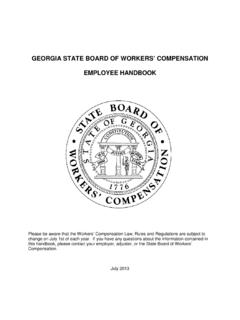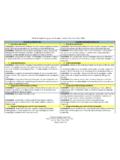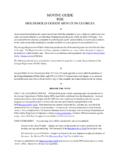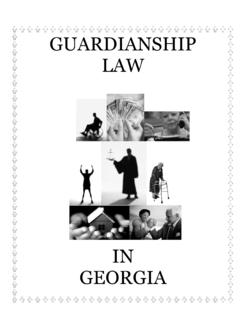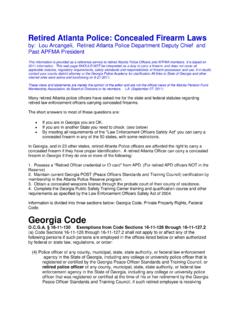Transcription of Georgia Nuisance Law Provides Relief for …
1 Georgia Nuisance Law Provides Relief for wronged landowners Everyone living in Georgia is familiar with the almost overnight appearance of large scale housing and commercial developments where large tracts of previously forested land once stood. Although many of us would prefer that the land remain in its natural state, economic growth is inevitable. Requiring the land to remain undeveloped may not be an option, but the law does require landowners , developers, municipalities, and counties to protect adjoining landowners from the unreasonable ravages of such development. Responsible developers and landowners understand the impact their development may have on their neighbors and undertake their improvement projects with a minimal amount of disruption and damage to the property of their neighbors. On the other hand, a subset of these developers and landowners has little concern about their responsibilities and obligations under the law. These are the developers and landowners who make their neighbors pay high costs for their irresponsible practices.
2 With increasing development, counties and municipalities often struggle to install and maintain appropriate sewage and flood control measures. Georgia Nuisance law also allows actions against counties and municipalities under special circumstances. Georgia law recognizes the rights of these adjoining landowners to recover damages to their property caused by those responsible. In fact, an entire body of Georgia law relating to Nuisance can provide wronged property owners with redress. Furthermore, this is an area of law where lawyers can provide their clients with a fair recovery and, at the same time, feel good about protecting Georgia from environmental damage and property right infringement. Because these cases also have 1the potential for recovery of attorney fees and for punitive damages awards, a properly prepared and executed case can also send the message to other developers and landowners that they should take their environmental responsibilities seriously. A discussion of Georgia law regarding Nuisance as well as the damages recoverable under this legal theory follows.
3 1 I. Nuisance Is A Commonly Used Cause of Action in Cases Involving Property Damage. Georgia Nuisance law Provides a potential remedy for landowners whose property has been damaged by the activities of a developer, neighboring landowner, or municipality. As Nuisance law demonstrates, Georgia law strongly protects the rights of property owners to the full use and enjoyment of their property without interference from anyone else. 41-1-1 defines a Nuisance as "anything that causes hurt, inconvenience, or damage to another and the fact that the act done may be otherwise lawful shall not keep it from being a Nuisance . The inconvenience complained of shall not be fanciful, or such as would affect only one of fastidious taste, but it shall be as would affect an ordinary, reasonable man." Lawful acts become nuisances when they are conducted in a manner causing hurt, inconvenience, or damage to Georgia courts have considered several factors in determining whether a Nuisance exists.
4 Specifically, (1) The defect or degree of misfeasance must be to such a degree as would exceed the concept of mere negligence. (A single isolated act of negligence is not sufficient to show such a negligent trespass as would constitute a Nuisance .) (2) The act must be of some duration .. and the maintenance of the act or defect must be continuous or regularly repetitious. 2 (3) Failure of [defendant] to act within a reasonable time after knowledge of the defect or dangerous These factors are interpreted consistent with a policy that "[p]rivate property cannot be physically harmed or its value impaired in [a negative] way, however socially desirable the conduct, without payment being made for the harm done, if the interference that is the consequence of the activity is substantial and considered to be unreasonable."4 As the above factors indicate, it is not necessary to directly own the land on which the Nuisance is located to have liability for a Nuisance . Instead, control of the land is the more important factor.
5 To recover for a Nuisance the plaintiff must demonstrate that the defendant was "either the cause or a concurrent cause of the creation, continuance, or maintenance of the Nuisance ."5 Defendants are not liable for flooding or other nuisances unless the activity occurs by "artificial" In other words, the fact that a naturally created situation on a defendant's land is causing harm to the plaintiff is insufficient to support a Nuisance claim unless the defendant cooperates with, augments, or accelerates the naturally occurring condition creating the Nuisance law has a notice provision that applies to certain defendants. Pursuant to 41-1-5 (b), it is necessary for a plaintiff to provide notice to a landowner about the Nuisance prior to filing suit if the landowner "merely acquires property on which there is an existing Nuisance , passively permits its continuance, and adds nothing thereto."8 It is not necessary to provide notice to a defendant who created or increased the If notice is required, the notice must request the potential defendant to abate the "Mere passive or constructive knowledge by a defendant of the 3existence of a Nuisance is insufficient to satisfy the requirements of this statute" if the notice requirement Because multiple parties may have control over a Nuisance , multiple defendants may have liability for the Nuisance .
6 The obvious defendant is the party creating the Nuisance . If a defendant created the Nuisance , that defendant "is liable for it even if he has sold the property containing the Nuisance ."12 In other words, a defendant cannot escape liability for creating a Nuisance by selling the property. But, purchasing property with a Nuisance may obligate the subsequent purchaser. Purchasers of a Nuisance are liable for the Nuisance if it continues to adversely affect the property after the new purchaser is requested to remedy the problem. "The maintenance of the Nuisance after notice is continuance of the Nuisance , and the purchaser of the property causing the Nuisance is responsible for that continuance, if there is a request for abatement before the action is filed."13 Plaintiffs also have the choice of suing multiple entities that may have an ownership interest and control over the property. These options are often necessary when a developer has created a corporation solely for the purpose of owning the specific property at issue.
7 Furthermore, under Georgia law, if the Nuisance is caused by the actions of a corporate agent, the plaintiff "may sue the individual agent, the corporation or both."14 Georgia law has also created exceptions for certain activities the law classifies as not qualifying as a Nuisance . These exceptions apply to certain agricultural activities,15 cultural facilities,16 and shooting 4 Defendants may be liable for nuisances created by independent contractors if the defendant accepts the independent contractor's work with knowledge of the Nuisance under a rule very similar to that which makes a principal responsible for unauthorized wrongs committed by his agent by ratifying This legal theory has been used to impose liability on homeowners who hired a contractor to make improvements on their property when the landowner had notice of numerous complaints about the development while it was still under These same landowners were also potentially liable under a theory that they also now control and maintain the Nuisances have often been found in cases where an upstream landowner's actions have caused flooding or increased silt deposits on a downstream landowner's property.
8 Georgia courts have held that one landowner "has no right to concentrate and collect water and thus cause it to be discharged upon the land of a lower proprietor in greater quantities at a particular locality or in a manner different from that in which the water would be received by the lower property if it simply ran down upon it from the upper property by the law of gravitation."21 For flooding caused by an upstream drainage ditch, "[t]he owner of a drainage ditch is under a duty to maintain it so that the surface waters do not overflow to the damage of adjacent property owners. Similarly, the owner of a creekbed containing a creek flowing through culverts constructed by such owner or his predecessor in title is under a duty to maintain them so that the waters do not overflow to the damage of adjacent property owners."22 It is necessary, however, for plaintiffs alleging nuisances from increased water flow to provide evidence that the water flow is occurring "in a manner different from simply running down upon it by the law of gravitation.
9 "23 It is not 5enough to simply allege that defendant is directing water flow directly onto plaintiffs' As the long body of Georgia case law on Nuisance indicates, landowners who have suffered injury from the actions of a neighboring landowner or developer may have a good claim under Nuisance law. If a defendant interferes with a plaintiff's property rights, Georgia law protects that plaintiff's right to the full use and enjoyment of his or her property from that interference. II. Municipalities Are Responsible for the Nuisances They Create and Maintain. Municipalities are liable for nuisances under certain circumstances. Municipal immunity from tort liability does not extend to Nuisance actions. "A municipality like any other individual or private corporation may be liable for damages it causes .. from the operation or maintenance of a Nuisance , irrespective of whether it is exercising a government or ministerial function."25 The policy underlying this exception to sovereign immunity is "based on the principle that 'a municipal corporation can not, under the guise of performing a governmental function, create a Nuisance dangerous to life and health or take or damage private property for public purpose, without juadequate compensation being first st and paid.
10 '"26 Georgia courts have established factors establishing municipal liability: "the defect or degree of misfeasance must exceed mere negligence (as distinguished from a single act); the act complained of must be of some duration and the maintenance of the act or defect must be continuous and regularly repetitious; and there must be a failure of municipal action within a reasonable time after knowledge of the defect or dangerous 6condition."27 When municipalities approve development projects which create a Nuisance , the city may be responsible for approving such For example, "where a municipality negligently constructs or undertakes to maintain a sewer or drainage system which causes the repeated flooding of property, a continuing abatable Nuisance is established, for which the municipality is liable."29 ld be To prevail on a Nuisance claim against a municipality, plaintiffs are required to establish a municipality's notice of the Nuisance and its failure to correct the problem once the municipality has notice of the problem.
